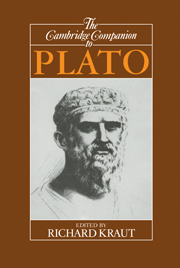Book contents
- Frontmatter
- 1 Introduction to the study of Plato
- 2 Plato
- 3 Stylometry and chronology
- 4 Socrates and the early dialogues
- 5 Mathematical method and philosophical truth
- 6 Inquiry in the Meno
- 7 Plato and Greek religion
- 8 Platonic love
- 9 Plato's metaphysical epistemology
- 10 The defense of justice in Plato's Republic
- 11 Plato on poetic creativity
- 12 Good-bye to the Third Man
- 13 Plato's Sophist on false statements
- 14 Disintegration and restoration
- 15 Plato's later political thought
- Bibliography
- Index
11 - Plato on poetic creativity
Published online by Cambridge University Press: 28 May 2006
- Frontmatter
- 1 Introduction to the study of Plato
- 2 Plato
- 3 Stylometry and chronology
- 4 Socrates and the early dialogues
- 5 Mathematical method and philosophical truth
- 6 Inquiry in the Meno
- 7 Plato and Greek religion
- 8 Platonic love
- 9 Plato's metaphysical epistemology
- 10 The defense of justice in Plato's Republic
- 11 Plato on poetic creativity
- 12 Good-bye to the Third Man
- 13 Plato's Sophist on false statements
- 14 Disintegration and restoration
- 15 Plato's later political thought
- Bibliography
- Index
Summary
In Book X of the Republic, Plato expels the poetry of Homer and his followers- “the poetry of pleasure” as he calls it- from his ideal state by observing that there is an ancient quarrel between philosophy and poetry. At the same time, he expresses a willingness to put aside the quarrel. His spokesman, Socrates, throws out a challenge: If the poetry of pleasure or its defenders can show that it is “not only pleasant, but also useful for cities and human life,” they would gladly receive it back (607a-e). Plato returns to this challenge in his last work, the Laws. The tragic poets approach the lawmakers and ask, May we bring our poetry to your city? The lawmakers reply that they, the lawmakers, are “poets” too, rivals and competitors in making the “most beautiful drama.” Their drama is the state, an “imitation of the most beautfiul and best life.” If the tragedians can show them dramas that agree with theirs, they will be allowed to perform; otherwise not (817a-d).
In the Laws, Plato takes the more conciliatory stance of one who admits rather than expels, but the quarrel persists. Only the type of poetry that is politically correct is permitted; the rest is banished. The reason is that poets and lawmakers are rivals in fashioning human life. Both are at once “makers” (the etymological meaning of poiētai, “poets”) and “imitators” of moral values; and in a wellordered society they must speak with one voice. This subordination of poetry to politics has offended many readers of Plato from antiquity to the present. Plato sees the poet primarily as a maker of ethics, and this concern appears strangely one-sided.
- Type
- Chapter
- Information
- The Cambridge Companion to Plato , pp. 338 - 364Publisher: Cambridge University PressPrint publication year: 1992
- 25
- Cited by

